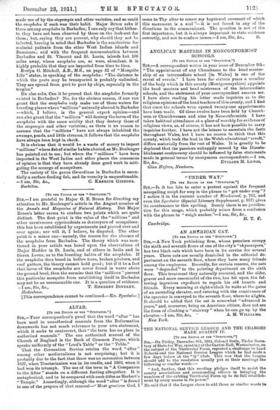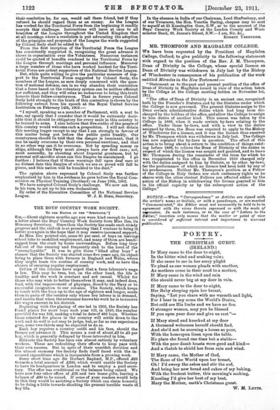THE NATIONAL SERVICE LEAGUE AND THE CHARGES MADE AGAINST IT.
[To THB EDITOR or THE "SPECTATOR."] Sra,—On Friday, December 8th, 1911, Colonel Seely, Under Secre- tary of State for War, speaking at the Caxton Hall, Westminster, on the subject of the Territorial Force, repeated a challenge to Lord Roberts and the National Service League which he bad made a few days before at the " Q" Club. This was that the League -should add to the resolution usually put at their meetings the following or similar words:— "And, further, that this meeting pledges itself to assist the county associations and commanding officers in bringing the numbers of the existing Territorial Force up to its full establish- ment by every means in its power."
He said that if the League chose to add those or similar words to their resolution he, for one, would call them friend, but if they refused he should regard them as an enemy. As the League ham worked for the Territorial Force from the beginning it readily accepts this challenge. Instructions will issue at once to all branches of the League throughout the United Kingdom that at all meetings where a resolution is put advocating the adoption of the principles and proposals of the League the words suggested by Colonel Seely shall be added to it.
From the first inception of the Territorial Force the League has consistently supported it, recognizing the great advance it shows in organization over the Volunteers. Numerous instances could be quoted of benefits rendered to the Territorial Force by the League through meetings and personal influence. Moreover a large number of those who have worked hardest for the Terri- torial Force are ardent supporters of the National Service League.
But, while quite willing to give the particular measure of sup- port to the Territorial Force suggested by Colonel Seely, the members of the League, as men deeply concerned with the ques- tion of national defeats°, can in no way abandon their contention that a force based on the voluntary system can be neither efficient nor sufficient, and they will relax no endeavour to bring this truth home to their fellow-countrymen. That in former years Colonel Seely held strongly to the truth of this contention is shown by the following extract from his speech at the Royal United Service Institution on February 14th, 1902 :—
"I myself, speaking as a member of Parliament, with a seat to lose, say openly that I consider that it would be extremely desir- able that it should be obligatory for every male in this country to be trained to arms. I also believe that five-sixths of the people of this country would welcome such a proposition. I will not detain this meeting longer except to say that I am strongly in favour of this matter being put before the public quite frankly. Our i countrymen should be told that the danger is imminent, that it can be easily overcome by their own personal exertions, and that in no other way can it be overcome. Not by spending money on ships, although the Navy must always have our first care ; not, most assuredly, by shouting about Imperial greatness, but by personal self-sacrifice alone can this Empire be maintained. I go further : I believe that if these warnings fall upon deaf ears at no distant date this Empire of which we are so proud will fall to pieces, and this nation will be humbled to the dust."
Tho opinion above expressed by Colonel Seely was farther emphasized by him in the evidence he gave before the Royal Com- mission on Physical Training (Scotland) on June 19th, 1902. We have accepted Colonel Seely's challenge. We now ask him, in his turn, to act up to his own declarations.
By order of the Executive Committee of tho National Service



































 Previous page
Previous page